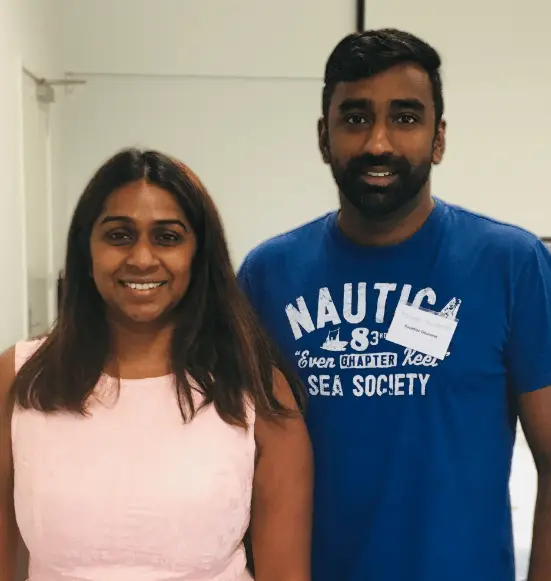Some companies start small, some with a bang. And some start on a hot kitchen stove at 1 am at the end of a big day at work. Speaking with Sangeetha and Mathan Selvarajah at our Food & Beverage Exporters Forum in Melbourne this year, we learned about the journey of Paradise Gourmet Foods.
“Nine years ago, my sister and I decided that we wanted to start a business,” Mathan told us. “Yes, I come from an accounting background and he comes from a science background,” Sangeetha said. “Our health started to be impacted from the long hours of work so we thought, ‘This is crazy; working like this for someone else – we should do it for ourselves!’ We tried a few things out, but people just keep telling us that they’re looking for Sri Lankan/Indian snacks, so we decided to try that out because we already knew the recipe.”
Growing demand for the taste of home
Working from their mother’s lentil chip recipe, the business grew and grew until their kitchen could no longer accommodate production levels. “People just wanted pallets and pallets of our chips, and it started to take a toll on our full-time jobs. We had to make a choice and ask ourselves, do we really want to take this seriously, or do we let it go and focus back on our full-time jobs?” Sangeetha said. “We thought, let’s take a chance while we’re young rather than doing it in our 50s!”
Adapting as you grow
Upon leaving their full-time positions, the sibling duo branched into the Asian frozen food market, via a business acquired for its space and equipment. “Peter Chan, who we bought the business from, has been a chef all his life. He taught us his recipes, and we grew from there,” said Sangeetha. Peter has a range of impressive professional experience, from 5-star hotels in Hong Kong and China to starring on a free-to-air television food show in Australia. “We really learnt from the best,” she said.
With the growing demand, they moved to bigger premises; a 2000 sqm site in which they created retail products and innovated, always looking for more and different ways to produce.
It was a short step from there to branch into Middle Eastern cuisine and finally, supplying Qantas, with a Gozleme. “We just kept growing from there, expanding our food service customers, and coming up with new products,” they told us.
Supplying to markets with differing needs
Being a diverse and adaptable company comes with its own challenges. Halal certification for UAE and Malaysia, for example, is a quandary because their pork products are their biggest sellers in Australia.
And while there are challenges, this all-in attitude has meant they’ve tackled every challenge head-on and come out on top. “At today’s forum we learnt that lentils are over-saturated in the UAE market,” said Sangeetha. “But because we believe our lentil chips are different, we’ve realized that we have to brand them differently so that they don’t compete with American lentil or other hummus chips in that market.” They may, for example, investigate various certifications before venturing overseas to approach suppliers.
“Essentially, our lentil chip is only available in one village in the north of Sri Lanka – that is how unique this product is. We grew up with it. It gets us excited when people try it and say, ‘Ohh, I used to have this when I was young!’ It’s what we’re most passionate about, and now we have a better chance of getting it out there. To us, this is the taste of home.”
Taking the next step
If you’ve got a product you’re excited about, and you’d like to find a way to share it with the world, reach out – we’re working passionately towards realizing that vision for our clients and can help you, too.



